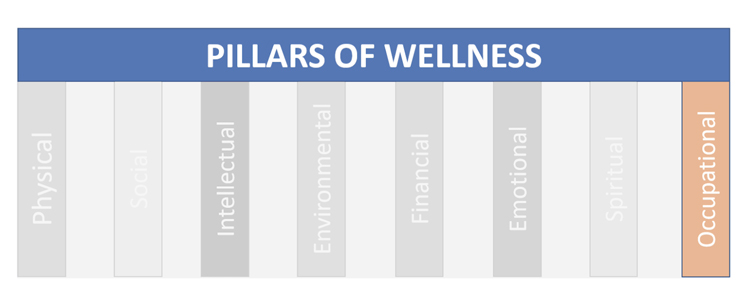Choose a career which is consistent with your personal values, interests, and beliefs and develop functional, transferable skills through structured involvement opportunities. Focus on the experience you will gain and strive to build positive relationships with co-workers and supervisors. Even if you have landed your dream job, it is still important to balance work and your personal lifestyle to avoid burnout, and to assess if you are being treated fairly.

Personal satisfaction at Work
The Occupation Dimension
The occupational dimension recognizes personal satisfaction and enrichment in one’s lifestyle through work. At the centre of occupational wellness is the premise that occupational development is related to one’s attitude about one’s work. Find the benefits and positives in your current job.
Our attitude and ability to effectively deal with work, and career goals greatly affect wellness, performance, interactions with others and overall success. A person who is doing exactly what they want to do in their lifestyle and is comfortable and content with their work and leisure plans, is in a healthy state of occupational wellness.

If you know you are on the right track, if you have this inner knowledge, then nobody can turn you off no matter what they say. -Barbara McClintock
Do what you love doing
When at work it can be a place where you can contribute your unique gifts, skills, and talents to work that is both personally meaningful and rewarding. You will convey your values through your involvement in activities that are gratifying for you.

“Do what you love doing and you will never have to work a day in your life” – Marc Anthony
Steve Jobs quote – “Your work is going to fill a large part of your life, and the only way to be truly satisfied is to do what you believe is great work. And the only way to do great work is to love what you do. If you have not found it yet, keep looking.”
Your personal learning style
Identify people in your network and beyond who hold your dream job – or something close to it – and ask for an opportunity to speak to them. By thinking creatively about how you can pursue your passion while still making a living, you will get closer to reaching your dream job without losing financial stability.
Oftentimes, it is not just the work that we love. It is the reward and satisfaction we get after doing it well. When sharing your passion with others, you may become aware of what your talent misses and what are improvements that you can make.
Put your abilities into your passion as it is the best investment that you can make. We all come into this world with natural abilities and some things we do almost instinctively. Take a good look at realize what you are good at.
Learning and growing
Occupation wellness is an opportunity to learn and grow as an individual and allows you to measure your capacity to give back and make a sound contribution in a professional setting.

A sure way of growing and learning at work is not only in the initial skill set you were hired for, but to mentor someone, improve your social and communication skills. Be a person of value rather than an unknown entity. Invest in some coursework or professional training in that area to gauge your talent and endurance
Improve your aptitude, ability to strive, achieve and to get the job done. This helps to reflect on your ability to perform a task well, problem solve, develop tactical competencies, and seek personal fulfilment. At the end of the day it is satisfying to say I have done the best I can, I have made a positive difference to my work, my colleagues and most importantly to MYSELF.
“The person who can manage themselves, is an individual who’s fit enough to govern a nation.”
Balancing Your Work and Lifestyle
People with a healthy lifestyle balance have clear prioritisation between work, which combines their career, education, ambitions, and lifestyle, which incorporates their health, leisure, and relationships. The Pillars of Wellness series you have followed so far is but a start for your growth and well-being. Getting it right will help you in avoiding Burnout, Reducing Stress, Reducing Anxiety, and work conflicts.
Lifestyle balance is an ongoing process, it requires continuous assessment and adjustments as we face the ever-changing situations of lifestyle and work. Having a strategy and goals for maintain the balance is a key element in retaining balance. We all experience different aspects of our work and lives – ( Social, Emotional, Physical, Intellectual, Financial, Environmental, Spiritual, Occupational) and the ups and owns in these areas impact the balance we have at work and in our lives.

It is a dynamic process and at some point, it is difficult to differentiate between work and our lifestyle. Our Social, Emotional, Physical, Intellectual, Financial, Environmental, Spiritual, aspects affect our work and our very essence of life. The resulting symptoms of imbalance produce – Conflicts, Absenteeism, Presenteeism, Stress, Anxiety, Depression. These will be evident in our workplace and our lives if they are not in balance. It takes work and commitment to keep it in balance.
It is within these strategies that we often wind up misplacing our priorities and find ourselves falling out of balance. Although we each have different interpretations of what work-lifestyle balance looks like, most people, in principle, hold a similar view of what lifestyle balance means:
“To have time available for doing the things we’re passionate about, outside of a work-focused environment.”
Lifestyle balance could mean spending more time with family, more time on self-development, time socialising with friends and community or even having more time to spend at the gym getting into better physical shape. You are the only person who can regulate and balance your work and life.
Parting Thoughts
How does your current understanding of Wellness stack up? Which of the pillars are you going to start, improve or progress with?
Thank you for your time and attention as you followed us in this series.
Occupational Pillar – Check Up
Personal Satisfaction At Work
- How did you get here?
- Is the work you do really what you want to do?
- What is it about this job that I love?
- Do I get the job done to the best of my ability?
- What do I need to change or address to improve?
Do What You Love Doing
- Are you doing what you love to do for work?
- Is what I do self-rewarding and meaningful to me?
- Am I making a difference in what I do?
- Do I contribute or impede both my own and others growth?
Learning and Growing
- Am I learning to problem solve?
- How am I growing as person at work?
- What is my future mapping like for my career?
- Have I done my best today?
Work and Lifestyle Balance
- How am I using my Time Management skills at work?
- In what ways do I plan to grow my skills?
- Do I disconnect from work when I leave work?
- What is my exercise plan for today?
- How do I plan to spend more time with family and friends?
- Which of my interests / hobbies do I plan to grow outside of work?
Get In Touch
Should you have any questions regarding WELLNESS or MENTAL HEALTH please contact us.



